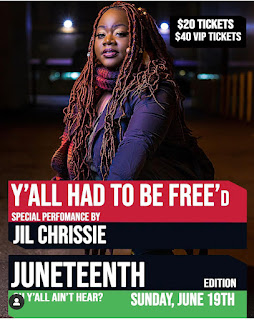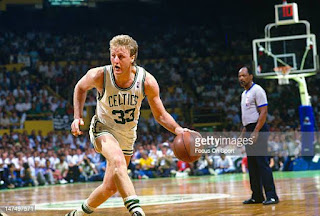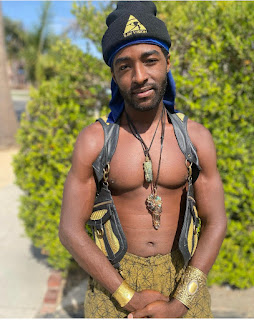This is part II of an interview with Steven Marcus Releford, Niles Abston and Johnny Mac, a few of the brilliant minds behind "Y'ALL HAD TO BE HERE." For those who missed their legendary, sold-out show last time, you have a new opportunity to experience their multimedia music and comedy extravaganza thanks to "Y'ALL HAD TO BE FREE'D" live at Bar Lubitsch at 7702 Santa Monica Blvd., West Hollywood, CA on June 19th at 8:30 PM. You can buy tickets for that show right here.
...
Johnny Mac has a good point about how social media has impacted stand up comedy.
Steven Marcus Releford: Doing stand up I was apprehensive about social media. "Why do I need social media if I'm already out there doing stand up? That's not where it's at!"
At least you had developed mad skills at places like The Garage before focusing on social media. Many people don't want to put in the work. Desmond Dekker was a Jamaican musician and producer that helped create Bob Marley and The Wailers. To sharpen them up into the perfect machine for playing live music with no fear Dekker would have the band perform alone in graveyards at midnight for the dead.
Niles Abston: That's what an open mic is like. If you could perform for the dead then having fifteen live people watching you is going to give you that energy. That's what The Garage open mic was like. If you can perform for people knocked out in their chairs drunk and asleep...
You know you're ready for the big time.
Niles Abston: When I was putting my Netflix special together, I knew that if my joke made people chuckle at The Garage, than the same joke for one hundred people who paid to see me will cause the roof to come off. That was always my gauge, does it get laughs at The Garage mic? If it doesn't I'm throwing it out.
What you said about Desmond Dekker making the band perform in the graveyard, if the band can bring that much energy to a live crowd and they do well it makes perfect sense. The Garage was our graveyard.
Plus, any Los Angeles stand up comic performing live is going to be tougher because L.A. stand up comedy is tough.
Niles Abston: You have to want to be here to be here.
It's a gift for the audience too because all of you sharpened your acts at The Garage together, so now you are bringing the finished product to the people paying you to perform.
Steven Marcus Releford: There is an element in this group that we have from performing shows together for years. We've been running shows for a while. We've been working the scene with feet on the ground so we know what's happening.
That's the energy we got from The Garage. With our show we'll all be able to witness the greats coming up. To have that osmosis between the people and us is that energy in the name, "Y'ALL HAD TO BE HERE." Because if you missed it you missed it, so now here it is, again.
Johnny, have you ever seen an LA comic that's more focused on creating a character to play in a Hollywood film, so they don't have real jokes, and then go out to New York City only to fail because of that deficit?
Johnny Mac: I've never personally seen it but it is kind of a known thing in New York City. It's a running joke in the scene. "I had an LA comic on my show and..."
Niles Abston: They had a lot of charisma.
Johnny Mac: Exactly. They were all personality and no jokes. Because in New York it's all about the jokes.
Niles Abston: When I moved there in 2019 I would always get the, "Are you sure you are an LA comic?" I didn't know what that. They really don't think we can write jokes out here because some people really went out there and fucked that all up.
There are killer joke writers up on stage out here, it's just that some people went out there before they were ready and fucked it up for the rest of us. That's why I started Basement Fest as a way to chip away at that. I'd bring comics out from LA for the festival and they'd kill in New York, so it's not the truth.
So LA can write jokes. I like how you created Basement Fest to defeat the stereotype.
Johnny Mac: Comedy is performance plus writing. You are the actor and the writer. And in LA you got a lot of actors who want to be comedians. They want to be funny actors. Someone like Will Ferrell, he's hilarious, but we don't know if he is a stand up comic. If someone wrote jokes for him though, he would kill it.
Niles Abston: We see those people there. They will yell the punch line. They'll change their voice into a British accent or they'll sing the punch line. Because they know that in their head there's a voice that's saying their shit ain't funny. So they throw something extra on it to try to make something else.
I've seen that all the time. Why are you faking a British accent if you aren't British? Why are you singing the punch line even though the joke is not about a song. Oh, because you are not funny, and I'm talking about a specific person, right now.
You're talking about many. I've seen a lot of comedians like that. For their punch line they'll use an emotional, cartoon voice and transform into a different human being. They'll use a radio disc jockey voice like they are doing a commercial or suddenly screech their punch line and shock the audience into laughing because of the cringe factor. They'll wave their arms like a windsock puppet because they don't have a punch line or much of a joke. People in mental institutions do that, so it seems funny.
Niles Abston: I know a lot of comedians that perform in their black voice. When they are up there doing stand up, that's not how they are in real life. They are trying to sound like a black person. You see a lot of white people doing it. Trying to sound black.
Johnny Mac: Growing up, most of my favorite comics were black. I did my own voice.
Steven Marcus Releford: I feel like stand up at large is kind of like the martial arts. LA has The Way of the Crane. New York has The Way of the Monkey. So it's like, if you pull back from it there are different styles, but there is an overlap of what makes comedy, comedy.
I believe that LA comics are under great pressure to be a character that works on film, instead of a stand up comic that performs on stage. Some great comedians would just never look good on film.
Steven Marcus Releford: My family was visiting the other day, and said, "Look at you. There's nobody like you on Netflix." It's like I have to fit the mainstream whatever so people will be like, "Ok, he goes into that box." Black comedians go through that too. People assume there are only three types of black comic archetypes.
Niles Abston: "Is he a crazy one?" One of the biggest comedy archetypes is what I call, "The Def Jam." It sounds crazy, but white comedians expected us all to be like that. They didn't even want to have Def Jam happen. That was invented by Russell Simmons and his company. They presented it to HBO and it almost didn't get made because they were trying to explain, like, that black comedy was synonymous with hip hop because hip hop was popular at the time.
It was the 90's so black comedy had to reflect that. They couldn't get black people to watch comedy, but there were these underground spots like The Peppermint Lounge live in New Jersey where you would go practice there and end up on Def Jam. If you could kill with the black crowd in New Jersey, you would end up on Def Jam and so that almost didn't make it on TV.
And now 20-30 years later, you want black comedians that you almost didn't want back then? So that means whatever the new wave is right now, you are suppressing that, and it almost won't happen. Whatever we do in 2022 with our finished product, they are going to make black people do that in 2040. That's just not going to work.
What you are doing with your show is a completely different art compared to Def Comedy Jam. With the current technology you'll also be able to present the show to more people than comedians could 20-30 years ago. It can be on YouTube, Hulu, Netflix...
Niles Abston: I kind of compare everything to NBA and basketball. Stand up comedy is a lot like the NBA. Back in the 80's Larry Byrd was one of the best basketball guys ever. Everybody was freaking out because he was making two or three threes a game. Now you got guys coming off the bench that are making two or three threes a quarter because the League realized three is more than two so lets just take more of these shots.
So for a kid growing up now they would watch a kid from the 90's would think it's boring because they are only scoring 80 points. Now it's just, shoot the three, shoot the three. The game has evolved. I feel like comedy has evolved that same way. Most of the stand up comedians you know have a podcast, edit the podcast on your own, direct on the side, write scripts, do stand up, run shows, do all these things and we are still expected to kill onstage like our predecessors.
Yes, that's right.
Niles Abston: I love Chris Rock. I love Dave Chappelle. I wouldn't be doing what I do without them. But if you compare 26 year old Chris Rock or Chappelle to 26 year old me, I would eat those motherfuckers alive because I have to edit, I have to direct, I have to write. I have to do all these different things they don't have to do, and I still have to do stand up.
The audience is also much more demanding. They have heard it all before.
Niles Abston: Exactly.
Steven Marcus Releford: Oh yeah. If we are all able to achieve what we've done now imagine how high we will fly when we can delegate these tasks to others and have that weight lifted off of us.
Johnny Mac: We are training with weights, dude.
Marcus was talking to me earlier about how just being his own manager takes away from the time he has to write jokes and perform.
Niles Abston: You gotta damn near be a company yourself.
Steven Marcus Releford: Its also a testament to being black on the scene. You have to work ten times harder and build that shit on your own.
Niles Abston: You can't just be good.
We were talking about it before, and what a lot of people don't understand about being African American in Hollywood is that you do not have the same generational wealth that white comedians and actors, mostly actors in Hollywood, have.
Niles Abston: We could do a Top White Actors List. Look at all the kids that are actors in Hollywood. They are all kids of white actors or executives. The only kids we have like that is Jayden Smith and he sells water. He doesn't even want to do that shit. He sells boxed water. He's like Jesus. Will Smith raised Jesus. He's like this good person that tries to help people, and then he makes music here and there. Every other white kid like Jayden Smith is an actor or producer.
It's also, look at the top studios you think of when you think of the giants even now that affect Hollywood. They are all white. And then you try to name a famous black Hollywood studio. You can't.
Niles Abston: Oh yeah. And they can only make so many projects a year. How many black kids growing up did you know that wanted to be a P.A. (production assistant)? They are like, "PA? Is that Pennsylvania?" But white kids will have families that get them to be a P.A. on a project, and now they can just sit back and watch a big time director do their job...
Steven Marcus Releford: And get paid $700 for a major fucking film.
Niles Abston: I'm finally going to get to watch a director do their thing because I had to grind for seven years, to get hired on a TV show, write that show, make it funny so I could see the words I wrote be directed. That's how I managed to see a major director work. While some other kid can just say, "I have an uncle that works here so I'm going to go check that out." So you just look at the hurdles we have to go through just to be around to see the stuff. Because you can't be the shit you want to be unless you see it.
It sucks because people tend to hang out, by default, with other ethnicities they are apart of, whether they are Armenians, Jewish or white, although LA and NYC are more integrated. To make it in Hollywood an African American has to hang out with those Hollywood industry, generational wealth Caucasians. That can be tough.
Steven Marcus Releford: That's where the resources are at. There are people starving right now, crossing deserts, looking for where the white people are at. "I don't care where I end up, I'm bringing my baby where the white people are at to find some food."
What bothers me about Hollywood is that there are no African American Golden Era Hollywood studios going back decades, but they are more than happy to profit from the African American, gangster stereotype. Or any black stereotype.
When I grew up, there'd be movies with African Americans shooting people, and they'd be more than happy to collect the money based on films like Boyz in the Hood, or Menace 2 Society exploiting the black gangster archetype.
Johnny Mac: They'll even hire white writers to tell black stories. It's crazy.
I understand how sometimes to tell a story you have to have an outside perspective, but you still have to represent that inside perspective without using a stereotype. Paul Mooney, a great man, understood the black experience, and had to explain to white people who aren't paying attention, especially middle class white people, by being an ambassador without insulting them when he wrote for The Cosby Show.
He provided an example of a happy, upper class black family to inspire others the way he could because he was dealing with white Hollywood executives. Hollywood has gotten better. Reservation Dogs, on Hulu, is doing a good job of talking about Native Americans without resorting to stereotypes.
Niles Abston: FX is killing it. At the end of the day that is a Native American show with a Native American creator, Taika Waititi, directs a lot of episodes, but they had to package their culture, while there are some rich white people that are like, "Ok, fine." Meanwhile there has never been a show that is too white for TV. You never hear that. But you hear, "Too Asian for TV, too black for TV, too Mexican," because we have to make our experience palpable to them, first.
When you look at Atlanta people think, "Wow, they are really talking about some shit black people don't get to talk about on TV." Here's the thing, you have to look at all the groundwork Donald Glover has done to make white people feel safe around him. Donald Glover is the safest bet for white people when it comes to a black guy. He's the black friend to white people.
He can rap, he's handsome, he's talented, he's been in so many spaces like 30 Rock and Community where he has collected all these white tokens in a way so that they say, "Yeah, we will let you make a TV show," and then, "Woah! That's not the show we wanted you to make...but it's making money." So he's been able to do what a black director hasn't been able to do on television because he has been so palpable to white people for so long.














No comments:
Post a Comment